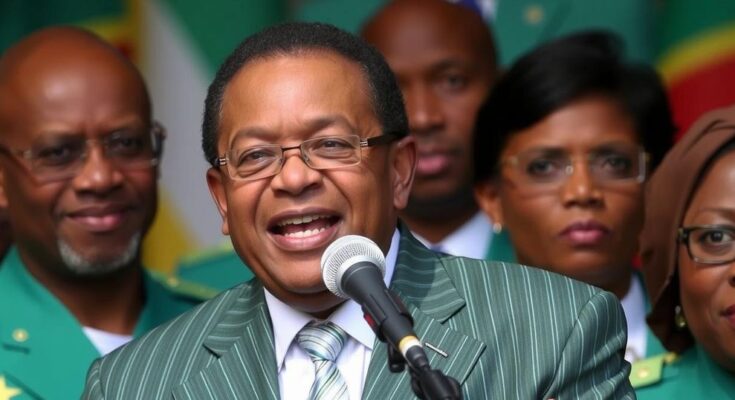Mozambique’s top court confirmed the ruling Frelimo party’s victory in disputed elections, amidst widespread allegations of fraud and violence. Daniel Chapo received 65% of the vote, while opposition leader Venancio Mondlane claimed electoral manipulation and threatened further unrest. The situation remains tense, with significant international concern over the potential for escalating violence.
On Monday, Mozambique’s Constitutional Court confirmed the ruling party Frelimo’s victory in the controversial October elections, following allegations of electoral fraud that sparked violent protests throughout the nation. The court ruled that Frelimo candidate Daniel Chapo obtained 65 percent of the votes, a revision from the electoral commission’s initial figure of nearly 71 percent. Chapo’s principal rival, exiled opposition leader Venancio Mondlane, was acknowledged to have received 24.2 percent of the vote, an increase from earlier assessments. This outcome solidifies Frelimo’s enduring hold on power as Chapo prepares to succeed President Filipe Nyusi, whose term will conclude on January 15.
The atmosphere in Mozambique remains tense, with heightened fears of violence following the court’s decision. Mondlane, who claims electoral manipulation benefited Frelimo, indicated intentions to contest the results, urging his supporters to remain steadfast in their demand for electoral integrity. In response to the unrest, the US government has urged restraint and called for dialogue among the competing factions. Observers have noted significant irregularities during the election process, intensifying the crisis.
In his initial response to his court victory, Chapo attempted to adopt a conciliatory tone, suggesting outreach to Mondlane, although the latter continues to articulate a vision of a popular uprising against what he perceives as a fraudulent electoral process. The situation is compounded by recent violence, which has resulted in at least 130 fatalities, predominantly among opposition demonstrators. Chaos has disrupted various sectors across Mozambique, including trade and essential services.
Amidst growing discontent, Pope Francis has called for reconciliation and dialogue to overcome the looming mistrust within Mozambique. Analysts forecast that if the Constitutional Council upholds the election results, it could escalate tensions even further, potentially leading to increased violence and civil unrest similar to the protests witnessed in other Southern African countries. The evolving situation highlights the fragility of peace and stability in Mozambique, emphasizing the need for all political entities to engage constructively ahead of potential confrontations.
The implications of this political turmoil remain serious, not only for Mozambique but also for regional stability in Southern Africa as rising discontent could provoke widespread upheaval.
In conclusion, the recent confirmation of the election results by Mozambique’s top court accentuates the deep divisions within the country as opposition leaders contest the legitimacy of the ruling party’s victory amidst widespread violence. With international observers expressing concerns, and calls for dialogue echoing from various quarters, the next steps taken by Chapo and Mondlane will be crucial in determining the future course of Mozambique’s political landscape.
Mozambique has been experiencing turbulent political conditions, particularly since the recent national elections in October, which have been marked by accusations of fraud and misconduct by the ruling party, Frelimo. The assertion of electoral manipulation has led to significant civil unrest, with opposition parties demanding accountability and transparency in the voting process. The international community has been monitoring the situation closely, highlighting the human rights implications of the ongoing strife. The historical context includes more than five decades of Frelimo leadership, which has increasingly faced challenges from emerging young opposition figures. The unrest underscores broader trends in Southern Africa, where economic despair and governmental distrust have fueled calls for reform.
The latest ruling by Mozambique’s highest court has confirmed the contentious electoral victory of Frelimo, deepening the political divide and escalating fears of further violence in the country. With opposition leaders contesting the results and calling for greater accountability, the potential for civil unrest remains high. The response from both local leaders and the international community will be critical in shaping the future of Mozambique, as the nation grapples with demands for transparency and justice in its electoral processes.
Original Source: www.wfxg.com




